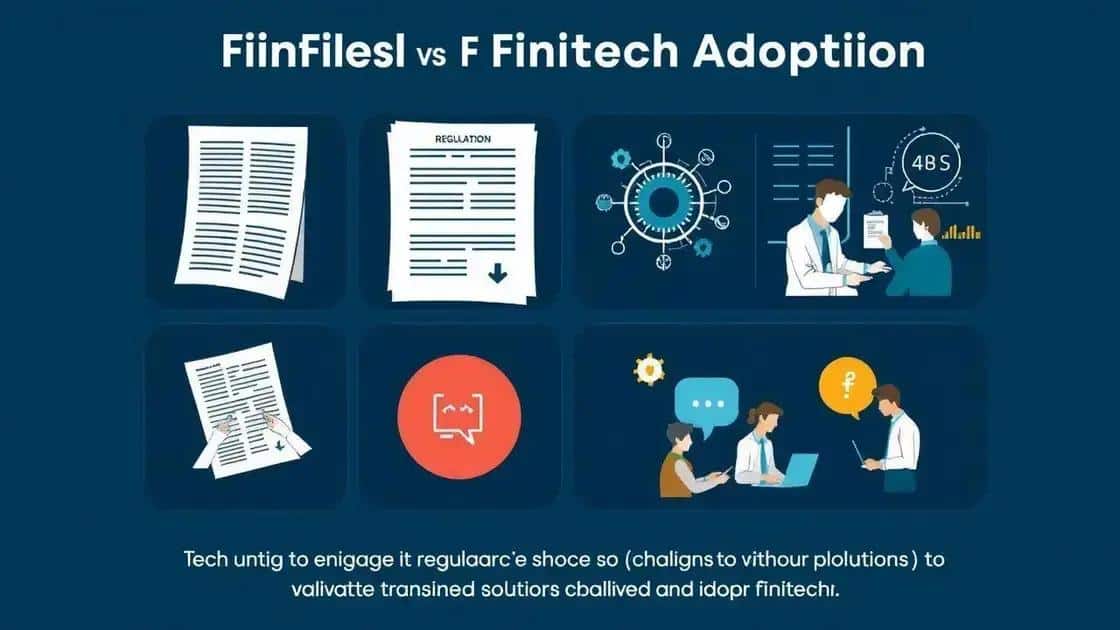Explains is what fintech? CNBC | Understand the impact

Fintech revolutionizes finance by offering consumers convenient access to banking services, personalized financial solutions, and lower fees, while also presenting challenges such as regulatory compliance and technology integration.
Explains is what fintech? It’s a term that’s buzzing right now! So, what does it really mean for you and your wallet? In this article, we dive into the fascinating world of fintech and explore its relevance in today’s economy.
Understanding the fintech landscape
Understanding the fintech landscape is essential for anyone curious about modern finance. Fintech, short for financial technology, combines technology with financial services to improve and automate financial systems. From mobile banking to online brokerages, fintech is changing how we manage money.
The components of fintech
Several components make up the fintech ecosystem. These elements work together to create innovative financial solutions. They include:
- Payment solutions: These services enable faster and easier transactions, both online and offline.
- Investment platforms: Users can invest in stocks and bonds without traditional brokers.
- Personal finance apps: These tools help users track spending and manage budgets.
- Blockchain technology: A secure way to record transactions, often linked with cryptocurrencies.
As the demand for convenient and efficient financial options grows, many companies are stepping into the fintech arena, eager to provide cutting-edge solutions. The rise of startups in this space showcases the creativity and adaptability inherent in technology-driven services. Traditional banks are also responding by adopting fintech strategies to remain competitive.
Challenges faced by fintech companies
Despite their advantages, fintech companies encounter various challenges. Regulatory compliance is a significant concern as they must navigate strict financial regulations. Security is another vital issue since fintech platforms handle sensitive user data.
Moreover, educating users about new technologies can be a hurdle. Many consumers remain skeptical about adopting digital solutions. Therefore, fintech firms often invest in user education to build trust and encourage adoption.
The landscape of fintech continues to evolve rapidly, offering exciting opportunities and challenges. With the promise of greater accessibility and innovation, the future of finance looks bright for fintech enthusiasts.
How fintech is reshaping traditional banking

How fintech is reshaping traditional banking is a hot topic in today’s financial world. Banks are quickly evolving, integrating innovative technologies to meet customer demands.
The shift towards digital banking
Digital banking has become the norm rather than the exception. Many consumers prefer online access to their accounts, which drives banks to enhance their digital platforms.
- Mobile banking apps: These apps allow users to manage their finances anytime, anywhere.
- Contactless payments: Using smartphones for quick payments revolutionizes in-store purchases.
- Account management: Customers can easily track their spending and savings goals through user-friendly interfaces.
- Personalized services: Banks tailor their offerings based on individual user data and preferences.
As competition increases, traditional banks realize they must adapt to survive. They often partner with fintech startups to leverage new technologies, allowing them to remain competitive in the market. This collaboration leads to innovative products that mix banking expertise with cutting-edge technology.
Benefits of fintech in banking
The rise of fintech brings numerous benefits to both banks and consumers. One major advantage is the enhanced customer experience, as technology simplifies interactions. Moreover, banks can operate more efficiently, reducing operational costs.
Fintech also improves security measures. Advanced technologies help protect customer information through encryption and other security protocols. As a result, customers feel more confident using digital banking services.
Overall, the integration of fintech is transforming traditional banking into a more accessible and efficient system for users. As we move forward, it’s clear that these changes will continue shaping the future of finance.
The benefits of fintech for consumers
The benefits of fintech for consumers are significant and wide-ranging. In recent years, financial technology has transformed how people access and manage their money, leading to a more user-friendly banking experience.
Convenience and accessibility
One of the primary advantages of fintech is the increased convenience it offers. Consumers can access banking services anytime, anywhere, thanks to mobile apps and online platforms. This shift allows people to manage their finances without visiting physical bank branches.
- 24/7 access: Users can check balances, transfer funds, and pay bills whenever they want.
- Quick setups: Opening an account online takes just minutes, compared to the lengthy processes at traditional banks.
- Instant notifications: Users receive real-time updates about their transactions, providing better control over their finances.
- User-friendly interfaces: Fintech apps are designed to be intuitive, making it easy for anyone to navigate.
Additionally, fintech solutions tend to be more affordable for consumers, as they often come with lower fees compared to traditional financial institutions. This cost-effectiveness makes it easier for individuals to manage their money and invest wisely.
Personalized financial solutions
With the power of big data, fintech companies can offer tailored solutions to consumers. These personalized services analyze individual user behavior and preferences to create unique financial plans. As a result, consumers receive recommendations that suit their specific needs.
Moreover, fintech tools empower users to take charge of their financial health. With access to budgeting apps and spending trackers, consumers can set and achieve financial goals with little effort. This newfound awareness often leads to better spending habits and overall financial wellness.
The combination of convenience, affordability, and personalized services illustrates why fintech has become a game-changer for consumers in today’s financial landscape.
Challenges and considerations in fintech adoption

The challenges and considerations in fintech adoption are crucial for both consumers and businesses. While fintech brings numerous advantages, transitioning from traditional banking methods may not be seamless.
Regulatory hurdles
One significant challenge is navigating the complex regulatory landscape. Fintech companies must comply with a variety of financial regulations that vary by region. These regulations often dictate how companies handle consumer data, manage transactions, and ensure security.
- Data protection laws: Companies must ensure they meet privacy requirements to safeguard user information.
- Licensing and compliance: Obtaining the necessary licenses can be time-consuming and costly.
- Consumer protection: Regulations are in place to protect users from fraud and abuse.
As fintech evolves, companies often face additional scrutiny from regulators. This can delay product launches and increase operational costs, impacting innovation.
Technology integration
Implementing new technologies also presents challenges. Many traditional banks and financial institutions struggle with integrating fintech solutions into their existing systems. Legacy systems can be outdated, making it difficult to incorporate innovative tools without major overhauls.
Additionally, employees may need training to adapt to new technologies. Resistance to change can stem from a lack of understanding or fear of the unfamiliar, hindering effective implementation.
Despite these obstacles, consumers are increasingly recognizing the benefits of fintech. Awareness of technological advancements and their impact on personal finance plays a vital role in easing the transition. Education and support can help users feel confident in adopting these new solutions.
Addressing these challenges is critical for the successful adoption of fintech. As more individuals and institutions embrace technology, it will be fascinating to see how the industry adapts and evolves.
\n
| Topic | Details |
|---|---|
| 💡 Convenience | Access banking anytime, anywhere. |
| 💰 Cost Efficiency | Lower fees compared to traditional banks. |
| 🔍 Personalization | Tailored financial solutions for users. |
| ⚖️ Regulatory Challenges | Fintech must navigate complex regulations. |
| 🛠️ Tech Integration | Adapting new tech can be complex for banks. |
\n
\n
FAQ – Frequently Asked Questions about Fintech
What are the main benefits of fintech for consumers?
Fintech offers convenience, lower fees, personalized services, and easy access to financial tools.
What challenges do fintech companies face in adoption?
Fintech companies encounter regulatory hurdles, technology integration issues, and consumer skepticism.
How does fintech improve the customer experience?
Fintech improves customer experience by providing user-friendly apps, 24/7 access, and tailored financial solutions.
Are traditional banks adopting fintech solutions?
Yes, many traditional banks are partnering with fintech firms to innovate and enhance their services.





